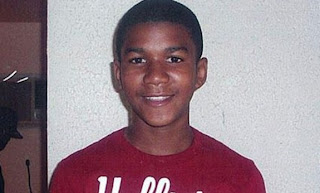 After the tragic slaying of 17-year-old Trayvon Martin in Sanford, Florida last month, the neighborhood watchmen who pulled the trigger, 28-year-old George Zimmerman is still not in police custody. This incident prompting marches, demonstrations, walk-outs and protests from angry people across the country who believe Zimmerman should have been arrested for shooting an unarmed teenager walking home from the store.
After the tragic slaying of 17-year-old Trayvon Martin in Sanford, Florida last month, the neighborhood watchmen who pulled the trigger, 28-year-old George Zimmerman is still not in police custody. This incident prompting marches, demonstrations, walk-outs and protests from angry people across the country who believe Zimmerman should have been arrested for shooting an unarmed teenager walking home from the store.
Millions across the country have donned hoodies, the same type of head covering Martin was wearing the night of his murder, to show their support of Trayvon Martin’s parents as they plead with the Sanford police department to make an arrest as an act of justice for the murder of their son. This tragedy is directly related to a racist attitude due to a racial slur Zimmerman made during a 911 call where he reported that a suspicious man was walking down the street who he later confronted and shot dead.

As adults we can’t ignore what happened simply because this incident is becoming a nationwide outcry. What brings this issue close to home is more than a look at the state of racist attitudes in this country, this incident yields way to a sense of fear and grief for all parents. Our children are hearing about this incident at school, they are watching our reactions and will internalize what this means to them and how they view and interact with the world.
Regardless of how you feel about it or how it stirs up negative emotions and memories in your own life, it is wholly important to plant seeds of peace into the lives of our children by discussing this incident honestly using it as a life lesson to teach about trust, safety and the warped mentality of racism.
Here’s how-
- Ask your child what he knows about the issue. Be sure to ask in a flat, non emotional manner that doesn’t extend your personal opinions or prejudices.
- Gauge how he feels about it by how he recounts what he has heard. It is common for children to feel scared or angry after hearing about the death of a child.
- Ask him if he has any questions about the issue.
- Gauge how he feels about the issue by listening to his tone and watching his body language. You know your child’s verbal cues. If your child is indifferent, he may feel that this situation does not affect him. If your child is indifferent, don’t push the issue with him. Skip to #6
- Answer any questions with facts that do not perpetuate the problem. Using racial slurs and curse words will infect your child with your own prejudices and this is unfair to them as they learn to interact with the world. Yes, you may be angry but your child does not have to be.
- Remind your child that not every person in the world behaves the way George Zimmerman did.
- Make an action plan with your child that dictates what he should do if he is alone and he feels that someone is following him.
- Talk to your child about the root of racism. Explain that racist people do not like themselves and need to criticize and condemn another group of people so that they will feel better about themselves. Explain that generalizations about any race or group of people is ignorant because no two people are the same.
- Tell your child that they don’t need anyone’s acceptance or approval in this world in order to know that they are loved, capable of achieving their dreams and purposed here.
- Tell your child you love him and there’s nothing he could ever do to change that. Remind him that if he ever wants to talk about this incident or anything else, you are there to listen. Give a quick hug or a pat on the back and tell him to go read a book.
You’ve done your part and all that is left for you to do is to continue to be an example of how to live and interact in this world. Your child is watching.


This is a great example of what we as parents should be teaching our children I’m glad I read the article and i’m definitely sharing this on my FB wall.